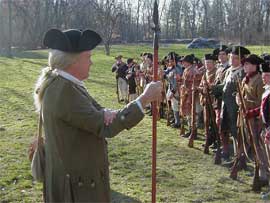Provincial law already required most men aged sixteen to sixty to drill with militia units four times a year. But with royal troops in Boston, Patriots saw a need to increase their preparedness—to demonstrate their determination to resist in order to make the government back down in the best case, to fight those redcoats in the worst.
Cain wrote:
Following the October 1774 orders of the Massachusetts Provincial Congress, provincial towns scrambled to put themselves onto a wartime footing. As part of the effort, many militia and minute companies passed resolutions or entered into covenants clearly outlining the expectations of military service. . . .Note that towns didn’t follow uniform standards on how much their minute companies would train. Because the Provincial Congress was a creation of the towns, without strict constitutional authority, it could recommend that men devote more time to military training, but it didn’t have the authority to require that.
Amesbury resolved that its minute men would engage in “exercising four hours in a fortnight.” Two weeks later, the town modified its order and instructed its minute men to “[exercise] four hours in a week.” The residents of Boxford voted on March 14, 1775, “that the minute-men shall train one-half day in a week, for four weeks after this week is ended.”
Each town could choose whether to form a minute company, what training schedule its militia companies would follow, and how men would be paid for their time—or if they were to be paid at all. As I wrote back here, Westborough’s town meeting debated at least twice whether to pay the minute men more than other militiamen and decided not to. Furthermore, as volunteers the men themselves had a lot of say in how much time they put in.
In Haverhill, Cain has noted, the meeting first decided its minute men should “be duly disciplined in Squads three half days in a Week, three hours in each half day.” (Did the reference to “squads” mean only parts of the whole company?) That schedule was replaced a week later with one requiring a full day of training once a week.
Cain also shared the transcription of a document from Haverhill prepared by Sgt. Mitchel Whittier, listing the men who belonged to the minute company and how often each had come to drills in March and April 1775.
The number of days men attended ranged from six down to one—or, if a horizontal line didn’t mean “ditto,” none. Only one of four sergeants and one of three corporals (“Coprel”) came on six days. Neither Capt. James Sawyer nor his two lieutenants showed up for all six drills. (Or perhaps there were more than six drills, and nobody showed up for all of them.)
The fact that so few men attended every drill strongly suggests that the community didn’t expect perfect attendance. As neighbors, they understood that illness, family responsibilities, bad weather, the farming workload, or other factors might keep a man from every training day. Nonetheless, the prevailing goal in rural Massachusetts in the early months of 1775 was to get more prepared for war.

Two more cases to add to the body of information on this topic.
ReplyDeleteIsrael Litchfield, a soldier of Scituate, kept a diary in which he recorded drilling with others of his company between November 8, 1774 and April 19, 1775. In that span of 162 days, Litchfield mentions participating in "exercise" on 15 days, and in "training" on 10 others days. Some of that drilling was done with no more than one or two others. Litchfield mentions only a single instance of live musket firing. His company did join in a regimental exercise on April 19, 1775--and then disbanded, because no alarm had reached them about the British march on Concord.
The town of Lincoln did not begin debate on forming a minute company until January 9, 1775, and then repeatedly postponed such questions as whether the minute men should be paid (ultimately the vote was No) and whether the town needed to increase its military stores of powder, lead, etc. The minute company was in fact formed sometime in February or early March 1775, and instructed to meet twice a week and drill four hours each time, until May 1st. There is no record of how often they actually drilled.
Here's a puzzle. The Lincoln's directive to its minute men that they should drill intensively until May 1st seems to recur in the instructions of many towns. That May 1st date does not appear to have been proposed by the Provincial Congress nor the Committee of Safety. Do we have any idea why that arbitrary date was chosen by towns?
Thanks for the additional data points!
ReplyDeleteAs for the 1 May date, my guess is that that month is when people perceived the Massachusetts legislative year to turn over. The General Court was usually dissolved by then, the towns held elections for new representatives, and those reps took office by the end of the month. Therefore, people might perceive a mandate (or suggestion) from a legislature to lapse in May, or they might hope a new legislature would offer province money for militia training so the towns didn’t have to pay.
As the Lincoln records show, towns—especially smaller towns—were reluctant to spend money if they didn’t absolutely have to.